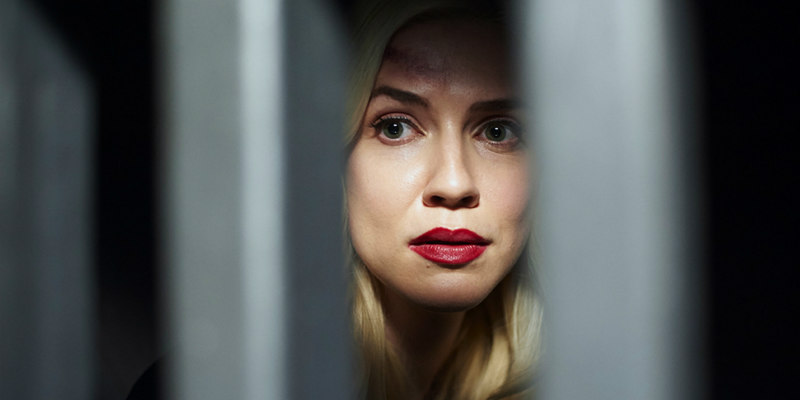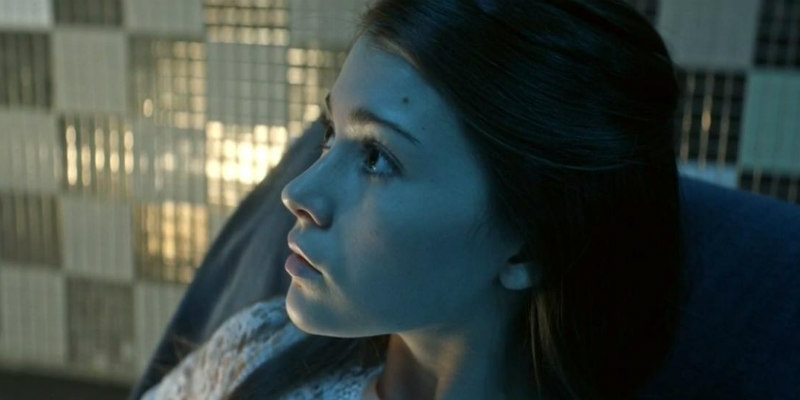Review by
Benjamin Poole
Directed by: Danishka Esterhazy
Starring: Katie Douglas, Celina Martin, Sara
Canning, Peter Outerbridge, Amalia Williamson, Kate Vickery

In media res: some little girls (12ish?), around 30 of them, are all
dressed in the same drab frocks, a severe fashion verdict which grimly
compliments the grey utilitarian walls of the narrow corridors and small
rooms where they seem to live. Adults boss them about to stay in line, when
to go to sleep and then when to wake up. The girls have to practise
"feminine virtues," like politeness and subservience - "bout time too, eh
lads?" And just when you’re thinking that, finally, someone has taken it
upon themselves to instil a bit of long overdue discipline and order into
the younger generation (nary a mobile phone or complaint about climate
change to be seen), it all goes a bit dark when one of the little ones are
taken out the back and shot offscreen for not taking the "vitamin" which is
forced upon them daily. Yikes, indeed.

So, this is the opening of Danishka Esterhazy’s ambitious, accomplished but, for varied reasons, difficult to warm to dystopian drama Level 16. It’s tricky to discuss the film without getting a little spoilery, so be aware from this point on we might go deep… Part of the problem with Level 16 is that opening: which immediately removes all ambiguity about the situation. Are the girls in a mad boarding school or some sort of borstal for posh kids? Why are they underground? Has there been some sort of nuclear war, or has the climate change which their peer Greta Thunberg (who, all joking aside, is clearly a hero and a potential inspiration to us all) cautioned about come to pass? These are intrigues which the film could tease out for atmosphere and suspense. But then a little girl gets shot for not taking a tablet which, within the first few minutes of the film, immediately tells us that this place is off and that it’s run by monsters. There’s a delicate balance to be struck when your narrative involves children in peril, and watching as a responsible adult, your suspension of disbelief can be overwhelmed by a reptilian, parental logic. Unlike Katniss Everdeen, these poppets are completely vulnerable, rendering them babes in the wood you just want to save rather than potential heroes who can fight back (mind you, I’m the person who watched It: The First Chapter too furious to be scared: big man clown picking on little kids for two hours? I spent the running time with my hands curled into fists, itching to smash the harlequin twat in his stupid red nose, the Todash bully).

That said, we do find a couple of rebels in the form of Vivien (Katie Douglas) and Sophia (Celina Martin), who cotton that something is rotten when their classmates/fellow inmates start disappearing one by one during lights out. Thing is that it takes these girls (the performances are universally fantastic, by the way) what feels like yonks to suss out the direness of the situation, an awareness that the audience had from the film’s opening scene: half way through, one of the kids realises with shock that the compound isn’t a "school, it’s a prison." Well, yeah. Then the film’s big reveal is saved for the reason why the girls are being kept in this Lowood gone worse, but, tbh, it’s neither here nor there by that point and the twist becomes less of a climax than a MacGuffin.

Turns out that the girls are being farmed for their unblemished skin, which, when they come of age, is removed and surgically attached to older women whose youth and beauty has long since flown. Yeah, it’s ‘a bit’. Level 16 makes the senseless underground shenanigans of Us seem perfectly sound. How is this business model sustainable or cost effective? Why is the complex so miserable, when everyone knows that smiles and laughter increases the skin’s suppleness (Level 16 would have been much more frightening if the kids were living a life of ignorant Riley before their faces got cut off, like geese whose livers are plumped up by the good stuff before they become foie-gras for some rich pig)? Why did that kid get shot: wouldn’t it have been easier (and cheaper) to, you know, just tell her off a bit? Of course, none of that matters if Level 16 is a polemic, dealing in allegory and the figurative to make a wider point about its cultural context. But this sort of reading is also unclear: is the film about the ongoing fetishisation of youth, a criticism of cosmetic surgery, a parable which explores this idea that these days no one can visibly age, and that the natural process of maturation is disguised by filters and expensive emollients? Not really, because our understandings are limited to the mystery of the compound. When the film ends, and someone at least manages to escape into the sunlight, the sympathy is palpable.

Level 16 is on Shudder UK now.

